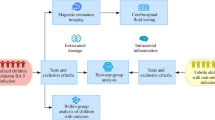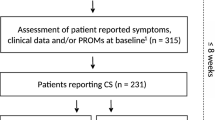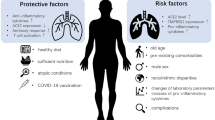Abstract
The post-COVID-19 syndrome is a new syndrome defined in patients with a history of probable or confirmed SARS-CoV-2 infection, usually within three months of the onset of COVID-19, with symptoms and effects lasting at least 2 months. This study is aimed at comprehensively comparing symptoms of the post-COVID-19 syndrome in children with Delta and Omicron variants. This prospective study included children with COVID-19 followed in hospitalized or outpatient clinics in a tertiary hospital. We used a special questionnaire to ask about the presence of persistent symptoms more than 12 weeks after the initial diagnosis. Patients with positive SARS-CoV-2 PCR were selected randomly and grouped according to the dominant variants in our country at that time as follows: Omicron group (after December 16, 2021); Delta (B.1.617.2) group (August 15, 2021, and December 15, 2021). This study included 200 children, 71 of whom were in the Delta group and 129 of whom were in the Omicron group. Weakness (8.5% vs. 1.6%; p = 0.017), the impact of physical efforts (5.6% vs. 3.9%; p = 0.020), fatigue (22.5% vs. 8.5%; p = 0.009), anxiety disorder (12.7% vs. 0.8%; p = 0.001), and gastrointestinal changes (12.7% vs. 4.7%, p = 0.050) were statistically significantly higher in patients with the Delta variant compared to patients with the Omicron variant. There were no differences between the groups regarding anorexia, anosmia/ageusia, arthralgia, influenza-like symptoms, sleeping disorders, decreased physical activity daily, headache, need for analgesia, concentration and memory disorder, and weight loss (p > 0.05).
Conclusion: This study showed that weakness, the impact of physical efforts, fatigue, anxiety disorder, and gastrointestinal changes were more frequent in the Delta group compared to the Omicron group. The incidence of post-COVID-19 syndrome is high in children as well as adults and affects several systems; therefore, it should be kept in mind that children should be followed for post-COVID-19 syndrome.
What is Known: • Despite the milder severity of acute COVID-19 in children, post-COVID-19 symptoms may occur. The post-COVID-19 condition is complex and novel, especially in the pediatric population. | |
What is New: • Post-COVID-19 symptoms in children differ depending on the viral variant. Post-COVID-19 syndrome has a great impact on the social life of children which may have serious and long-term effects. |
Similar content being viewed by others
Data availability
The corresponding author can provide the data supporting this study upon reasonable request, providing patient data privacy is not violated.
References
World Health Organization (2021) A clinical case definition of post COVID-19 condition by a Delphi consensus 2021. https://www.who.int/publications/i/item/WHO-2019-nCoV Post_COVID-19_condition-Clinical_case_definition- 2021.1. Accessed 30 November 2022
Ahmed H, Patel K, Greenwood DC, Halpin S, Lewthwaite P, Salawu A et al (2020) Long-term clinical outcomes in survivors of severe acute respiratory syndrome (SARS) and Middle East respiratory syndrome (MERS) coronavirus outbreaks after hospitalisation or ICU admission: A systematic review and meta-analysis. J Rehabil Med 52. https://doi.org/10.2340/16501977-2694
Peghin M, Los-Arcos I, Hirsch HH, Codina G, Monforte V, Bravo C et al (2019) Community-acquired respiratory viruses are a risk factor for chronic lung allograft dysfunction. Clin Infect Dis 69:1192–7. https://doi.org/10.1093/cid/ciy1047
Goërtz YMJ, Van Herck M, Delbressine JM, Vaes AW, Meys R, Machado FVC et al (2020) Persistent symptoms 3 months after a SARS-CoV-2 infection: the post-COVID-19 syndrome? ERJ Open Res 6:00542–02020. https://doi.org/10.1183/23120541.00542-2020
Jacobs LG, Paleoudis EG, Di Bari DL, Nyirenda T, Friedman T, Gupta A et al (2020) Persistence of symptoms and quality of life at 35 days after hospitalization for COVID-19 infection. PLoS One 15:1–14. https://doi.org/10.1371/journal.pone.0243882
Huang C, Huang L, Wang Y et al (2021) 6-month consequences of COVID-19 in patients discharged from hospital: a cohort study. Lancet. 397(10270):220–232
Carfì A, Bernabei R, Landi F (2020) Gemelli against COVID-19 post-acute care study group. Persistent symptoms in patients after acute COVID-19. JAMA 324(6):603-605
Buonsenso D, Munblit D, De Rose C, Sinatti D, Ricchiuto A, Carfi A et al (2021) Preliminary evidence on long COVID in children. Acta Paediatr Int J Paediatr 110:2208–11. https://doi.org/10.1111/apa.15870
Office of National Statistics. Updated estimates of the prevalence of long COVID symptoms. https://www.ons.gov.uk/peoplepop. Accessed 25 Nov 2022
Ludvigsson JF (2021) Case report and systematic review suggest that children may experience similar long-term effects to adults after clinical COVID-19. Acta Paediatr Int J Paediatr 110:914–21. https://doi.org/10.1111/apa.15673
Osmanov IM, Spiridonova E, Bobkova P, Gamirova A, Shikhaleva A, Andreeva M et al (2022) Risk factors for long covid in previously hospitalised children using the ISARIC Global follow-up protocol: a prospective cohort study. Eur Respir J 59. https://doi.org/10.1183/13993003.01341-2021
Kostev K, Smith L, Koyanagi A, Konrad M, Jacob L (2022) Post-COVID-19 conditions in children and adolescents diagnosed with COVID-19. Pediatr Res 1–6. https://doi.org/10.1038/s41390-022-02111-x
Janet V Diaz, Joan B Soriano (2021) A Delphi consensus to advance on a clinical case definition for post COVID-19 condition: a WHO protocol. Protocol Exchange
Antonelli M, Pujol JC, Spector TD, Ourselin S, Steves CJ (2022) Risk of long COVID associated with Delta versus Omicron variants of SARS-CoV-2. Lancet 399:2263–4. https://doi.org/10.1016/S0140-6736(22)00941-2
Götzinger F, Santiago-García B, Noguera-Julián A et al (2020) COVID-19 in children and adolescents in Europe: a multinational, multicentre cohort study. Lancet Child Adolesc Health. 4(9):653–661
Zimmermann P, Pittet LF, Curtis N (2021) How common is long COVID in children and adolescents? Pediatr Infect Dis J 40:E482-7. https://doi.org/10.1097/INF.0000000000003328
Brackel CLH, Lap CR, Buddingh EP, van Houten MA, van der Sande LJTM, Langereis EJ et al (2021) Pediatric long-COVID: an overlooked phenomenon? Pediatr Pulmonol 56:2495–502. https://doi.org/10.1002/ppul.25521
Blomberg B, Mohn KGI, Brokstad KA, Zhou F, Linchausen DW, Hansen BA et al (2021) Long COVID in a prospective cohort of home-isolated patients. Nat Med 27:1607–13. https://doi.org/10.1038/s41591-021-01433-3
Ashkenazi-Hoffnung L, Shmueli E, Ehrlich S, Ziv A, Bar-On O, Birk E et al (2021) Long COVID in children: observations from a designated pediatric clinic. Pediatr Infect Dis J 40:E509-11. https://doi.org/10.1097/INF.0000000000003285
Sterky E, Olsson-Åkefeldt S, Hertting O, Herlenius E, Alfven T, Ryd Rinder M et al (2021) Persistent symptoms in Swedish children after hospitalisation due to COVID-19. Acta Paediatr Int J Paediatr 110:2578–80. https://doi.org/10.1111/apa.15999
Stephenson T, Pinto Pereira SM, Shafran R, de Stavola BL, Rojas N, McOwat K et al (2022) Physical and mental health 3 months after SARS-CoV-2 infection (long COVID) among adolescents in England (CLoCk): a national matched cohort study. Lancet Child Adolesc Heal 6:230–9. https://doi.org/10.1016/S2352-4642(22)00022-0
Smane L, Roge I, Pucuka Z, Pavare J (2021) Clinical features of pediatric post-acute COVID-19: a descriptive retrospective follow-up study. Ital J Pediatr 47:1–4. https://doi.org/10.1186/s13052-021-01127-z
Say D, Crawford N, McNab S, Wurzel D, Steer A, Tosif S (2021) Post-acute COVID-19 outcomes in children with mild and asymptomatic disease. Lancet Child Adolesc Heal 5:e22-3. https://doi.org/10.1016/S2352-4642(21)00124-3
Radtke T, Ulyte A, Puhan MA KS (2021) Long-term symptoms after SARS-CoV-2 infection in children and adolescents. JAMA 326(9):869–71. https://doi.org/10.1001/jama.2021.11880. Epub ahead of print. PMID: 34264266; PMCID: PMC8283661
Molteni E, Sudre CH, Canas LS, Bhopal SS, Hughes RC, Antonelli M et al (2021) Illness duration and symptom profile in symptomatic UK school-aged children tested for SARS-CoV-2. Lancet Child Adolesc Heal 5:708–18. https://doi.org/10.1016/S2352-4642(21)00198-X
Miller F, Nguyen V, Navaratnam A, Shrotri M, Kovar J, Hayward AC et al (2021) Prevalence of persistent symptoms in children during the COVID-19 pandemic: evidence from a household cohort study in England and Wales. MedRxiv 2021.05.28.21257602
Byambasuren O, Stehlik P, Clark J, Alcorn K, Glasziou P (2023) Effect of covid-19 vaccination on long covid: systematic review. BMJ Med 2:e000385. https://doi.org/10.1136/bmjmed-2022-000385
Ayoubkhani D, Bosworth M (2022) Self-reported long COVID after infection with the Omicron variant in the UK: July 18 2022: the likelihood of self-reported long COVID after a first coronavirus (COVID-19) infection compatible with the Omicron BA1 or BA.2 variants, compared with the Delta variant, using data from the COVID-19 Infection Survey
Borch L, Holm M, Knudsen M, Ellermann-Eriksen S, Hagstroem S (2022) Long COVID symptoms and duration in SARS-CoV-2 positive children — a nationwide cohort study. Eur J Pediatr 181:1597–607. https://doi.org/10.1007/s00431-021-04345-z
Sykes DL, Holdsworth L, Jawad N, Gunasekera P, Morice AH, Crooks MG (2021) Post-COVID-19 symptom burden: what is long-COVID and how should we manage it? Lung 199:113–9. https://doi.org/10.1007/s00408-021-00423-z
Sudre CH, Murray B, Varsavsky T, Graham MS, Penfold RS, Bowyer RC et al (2021) Attributes and predictors of long COVID. Nat Med 27:626–31. https://doi.org/10.1038/s41591-021-01292-y
Fernández-de-Las-Peñas C, Notarte KI, Peligro PJ et al (2022) Long-COVID symptoms in individuals infected with different SARS-CoV-2 variants of concern: a systematic review of the literature. Viruses 14(12):2629. Published 2022 November 25. https://doi.org/10.3390/v14122629
Author information
Authors and Affiliations
Contributions
SYA, GA, and ZSB wrote the research protocol. FO, AA, and ZK accessed and verified all data. SYA and AA wrote the first draft of the manuscript. All authors contributed to the writing and approved the final version.
Corresponding author
Ethics declarations
Ethics approval and consent to participate
The Research Ethics Committee of the Medical School of Ege University and the Ministry of Health approved the study (ethical decision no. 22-3T/30). Written informed consent was obtained from all participants. Our research was carried out in line in accordance with the standards.
Competing interests
The authors declare no competing interests.
Additional information
Communicated by Tobias Tenenbaum
Publisher's Note
Springer Nature remains neutral with regard to jurisdictional claims in published maps and institutional affiliations.
Rights and permissions
Springer Nature or its licensor (e.g. a society or other partner) holds exclusive rights to this article under a publishing agreement with the author(s) or other rightsholder(s); author self-archiving of the accepted manuscript version of this article is solely governed by the terms of such publishing agreement and applicable law.
About this article
Cite this article
Yildirim Arslan, S., Avcu, G., Sahbudak Bal, Z. et al. Evaluation of post-COVID symptoms of the SARS-CoV-2 Delta and Omicron variants in children: a prospective study. Eur J Pediatr 182, 4565–4571 (2023). https://doi.org/10.1007/s00431-023-05134-6
Received:
Revised:
Accepted:
Published:
Issue Date:
DOI: https://doi.org/10.1007/s00431-023-05134-6




